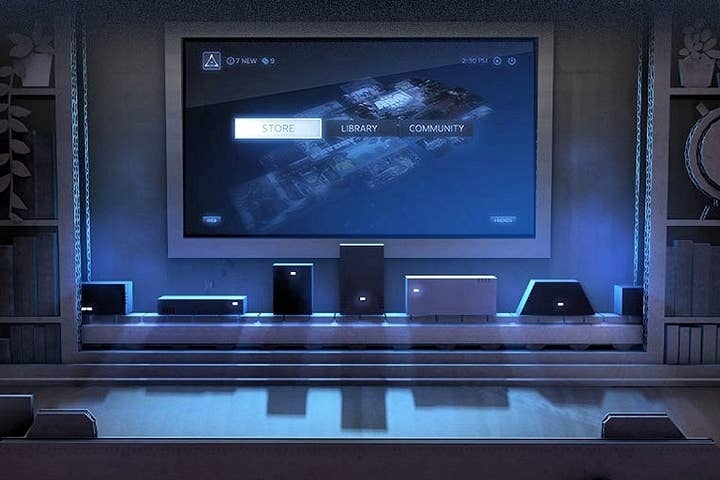Valve is the champion PC gaming deserves
Taking the fight to the living room - Valve's Steam is the most dynamic force in PC gaming in decades
It's quite extraordinary to look at Valve's Steam platform today and think back to its first appearance - as the much-derided and rather unstable digital distribution millstone around the neck first of Counter-Strike and later, somewhat decisively, of Half-Life 2. From such humble beginnings, Steam has become the dominant distribution network for PC games and changed its creators at Valve from a single developer of wonderful if incessantly delayed games into the most powerful company in the PC gaming market - more powerful than any publisher (EA's Origin system is a minor challenger to Steam's dominance) and even more powerful than Microsoft, whose Windows operating system is no longer the only saloon in town for PC gamers.
"Valve's intention with these moves is not modest, nor is it in any way disguised. Valve wants to own PC gaming"
The story of Steam is fascinating precisely because anyone predicting this outcome back in 2003 would have been laughed out of the room - and Valve is clearly in no mood to sit back and crush its carefully-tended laurels. The industry is still digesting the potential impact of the company's three recent announcements. Valve's independence from Microsoft's operating system, which began with moving Steam to OSX (essential, giving the increasing dominance of Apple devices in the high-end consumer space) and then to Linux (which looked rather less essential at the time), now looks much more aggressive thanks to the firm's move to create its own Linux-based gaming OS. Meanwhile, it's finally confirmed plans to define and certify a hardware spec for living room PCs, known as Steam Machines, and unveiled an unusual and potentially very interesting controller for those devices.
Valve's intention with these moves is not modest, nor is it in any way disguised. Valve wants to own PC gaming - to the same extent that Sony owns PlayStation gaming or Microsoft owns Xbox gaming, if not in the same manner. Valve wants Steam to be a third pole of the core gaming market (fourth, if you count Nintendo, although they're really playing a different sport entirely) - one which appeals to a somewhat different market and operates on very different principles to the traditional consoles, but which is focused around the Steam platform for distribution and functionality just as much as consoles are focused on PlayStation Network or Xbox Live.
For this approach to work, the move to the living room is crucial. Ignore the would-be iconoclasts who claim that gaming on a TV with a controller in your hands is old hat, and we're all soon going to be doing everything with an iPad; this is little more than second rate soothsaying from tech-fetishists who consistently make the same fundamental error of assuming that just because something can be accomplished technically, it means consumers will actually want to do it, and just because something is technologically impressive, it makes it into a good and worthwhile experience. The reality is that the market for the kinds of experiences afforded by a big screen and a dedicated controller (be it a joypad, a keyboard and mouse combo, or something in between, as Valve's proposed solution appears to be) is larger than ever and will continue to grow even in the age of tablets and phones - in the end, it will be dwarfed by the games market on those devices, but will still end up being larger and healthier than it is today. Valve's move on the living room is not backwards facing, it acknowledges a realistic market view that's all too easily obscured by our newfound excitement at having cute little computers in all our pockets.
"The higher specs of Steam Machines will look great to some parts of the market but will also become outdated faster than consoles"
In Valve's worldview, the great advantage of PC gaming (and how long before we all start calling it Steam gaming, a term that's already got a certain degree of traction?) is that it can take pride of place in the living room without sacrificing the study or the bedroom. Valve starts from the opposite side of the pitch from Sony and Microsoft - it operates a supremely successful software platform with no hardware attached, while the others are hardware manufacturers (perhaps ironically in Microsoft's case) whose software platform evolved later and is still tied to specific hardware devices. That comes with big advantages - you can create an iconic hardware design that leverages enormous cost savings thanks to manufacturing tens of millions of units, and sell them to consumers at far less than the cost that a third-party box builder would have to charge. It also brings disadvantages, though. PS4 and Xbox One will never be general computing platforms, and they'll never be available in the sheer range of form factors that Steam can reach - from a Steam Machine under the television to a powerful tower in the den through to a gaming-specced laptop in the student dorm room. In Steam's hegemony, Steam Machines will still only be one possible option - every PC and Mac sold will still be a potential device for the Steam platform.
For some people, Steam is guaranteed absolute victory in the end simply on philosophical grounds - open always beats shut, they declare, which is a statement that needs a fair few more qualifications than you might like in order to actually make it true, but is still a provocative sentiment. Of course, Steam is only sort-of open. You can run it on any PC or Mac hardware, it's true, but you can't release any software you want on it - Valve still acts as a gatekeeper of sorts, albeit a bit more open than the console firms are (though they are both, at somewhat different rates, moving towards more openness on their publishing platforms). In that sense, Steam is a less open platform than, for example, iOS - although anyone who actually wants to step outside the Steam ecosystem need only drop back to a desktop and install anything they want, which makes Steam Machines and their ilk into the obvious gaming devices of choice for hobbyists and the technically inclined, just as PCs have always been.
What is far more important than the question of whether "open always wins" or not (spoiler: it doesn't, unless you seriously mess with your definitions of "open" to the point where they're practically meaningless to most people) is the fact that Valve's moves are absolutely designed to align PC/Steam gaming with console gaming in the living room, and create a genuine, workable third way for console gamers considering new pastures, PC gamers tempted by the simplicity of console, and newcomers dipping their toes in the gaming waters (yes, plenty of those still exist - they're not all simply getting as far as Hay Day and Candy Crush Saga and declaring themselves satisfied).
"It's the kind of input the PC gaming market needs to remain not only fresh, free and dynamic, but also commercially credible over the next five to ten years"
There are huge challenges to this approach, of course, and I fear that nothing Valve can do is going to smooth out some of the wrinkles involved with PC gaming. PC devices are more expensive than consoles because they're manufactured by third parties who want to make a profit from the hardware, and don't have the advantages of scale that console makers enjoy - so the Steam Machines will probably be great devices but will represent a much bigger investment than a console. Moreover, their higher specs will look great to some parts of the market (although they'll be gobbledegook to lots of other demographics) but will also become outdated faster than consoles - a major reason for PC gamers to 'lapse' to console remains the upgrade treadmill, and I have to confess, there's a certain pleasure for this lapsed PC gamer in sticking The Last Of Us into a 6-year-old PS3 in the absolute knowledge that it's going to play it perfectly. Steam Machines won't enjoy that advantage; for many, of course, they'll outweigh that problem with many advantages of their own.
It's easy to be a little bit spooked by the degree of dominance Valve is building over the traditionally open, free and somewhat Wild West world of PC gaming - but I think this is a development worth embracing. PC gaming may be a wild frontier, but it has always needed a sheriff - or rather, a shepherd, a company with a strong interest in guiding and developing the market while retaining its essential freedoms. Once, we all hoped that Microsoft would step up to that role, and for a while it actually did - hence the very existence of DirectX, for example. Of late, though, Microsoft's interest in PC gaming has been minimal, and even when it's stuck its oar in, it's rarely been welcome - Games for Windows Live being one memorable debacle. Valve taking the reins and delivering a great digital distribution and social play platform, following it up with credible pitches to marry the OSX and Linux markets to the Windows market and now proposing hardware outlines for living room gaming systems and a radical new controller - well, that's the kind of input the PC gaming market needs to remain not only fresh, free and dynamic, but also commercially credible over the next five to ten years, especially as tablets continue to usurp sales of consumer PC hardware.
Whatever your belief in the power of 'open', or your personal preference in gaming power, Valve's rise to being the dominant force in PC gaming and its representative in the wider industry is a positive and interesting move. It seems certain that core gamers' choices in the coming years will have to be carefully weighed between three different logos on the box - Sony's, Microsoft's, and Steam's.









